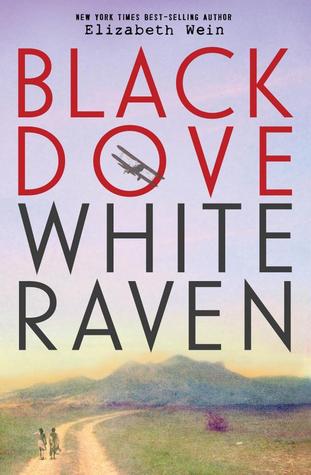[alert variation=”alert-info”]Publisher: Disney-Hyperion
Formats: Hardback, Paperback, eBook, Kindle, Audio Book, Audible
Purchase: Powell’s | Amazon | IndieBound| Barnes & Noble | iBooks[/alert]
Following her two exquisite WWII YA novels Code Name Verity and Rose Under Fire, Elizabeth Wein turns her focus to Italy’s invasion of Ethiopa in the mid-1930s. Teo and Emilia are the son and daughter, respectively, of Delia and Rhoda, a stunt-flying team who call themselves Black Dove and White Raven. After Delia is killed in a tragic accident, Rhoda fulfills Delia’s dream of relocating to Ethiopa, the homeland of Teo’s dead father, in the hopes they’ll find more opportunities there than in the United States.
In addition to highlighting the build-up to the Second Italo-Ethiopian War – an important but lesser known precursor to World War II – Black Dove is a story of new beginnings as Teo and Emilia adapt to their new home and Rhoda struggles to protect and later empower them in the face of impending conflict. Rhoda has already carved a place for herself in Ethiopia prior to the children’s arrival due to her skills as a pilot and the fact she’s in possession of a plane, but it’s not until she begins to teach Teo and Emilia to fly that the children are also able to find their own purpose. Like Verity and Rose, Black Dove is infused with Wein’s passion for flight and her ability to relate the mechanics of planes in a way that puts the reader right in the cockpit alongside training pilots Teo and Emilia. Through flight we are introduced to the landscape, culture, government, and people of a pre-invasion Ethiopa, and given a unique vantage point from which to witness the strategies and horrors of war.
Unfortunately, pacing is Black Dove‘s primary weakness. The first half of the novel drags, and often feels fragmented as we bounce from past to present, then to Emilia or Teo’s epistolary musings. While witnessing the slow, inevitable shift towards war provides tension, it often makes the characters feel like balls being bounced around. There’s a lot of physical movement in Black Dove, with the characters moving often between locations, yet they remain frustratingly static as people. While the book is narrated from both Teo and Emilia’s points of view – sometimes through their training flight logs and school assignments, other times through the stories of their fantastical counterparts Black Dove and White Raven – their relationship never feels as deep as it should. When Teo discovers a soul-wrenching truth of his father’s past, the revelation is blunted by the rushed pacing of the novel’s final third and the odd choice to use Emilia’s point of view exclusively for its final moments.
The novel’s greatest strength, however, is the character of Rhoda, who is a loving, reckless, and independent figure that leaps off the page. In fact, readers may find themselves wishing they could read a novel about Delia and Rhoda, whose history is a fascinating and thoroughly engaging backdrop to the novel’s events – far more than the novel’s central story.
[signoff predefined=”Social Media Reminder” icon=”twitter”][/signoff]

